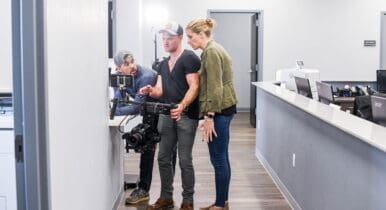The Advice Column: Do I Need a Partner To Launch My Own Firm?
Business columnist and President of BGSD Strategies Michelle Coyle offers advice on starting your own political consulting firm and whether or not remote work is here to stay following the pandemic.
Michelle Coyle is president of BGSD Strategies, where she provides strategic advice for political business owners. Have a question about your business? Email her directly at michelle@bgsdstrategies.com and she’ll answer them here.
Q: I just can’t go through another cycle working for someone else, but haven’t found anyone willing to partner with me to launch a company. Should I do it alone, or keep searching for a partner?
A: If you feel like you need a business partner in order to be able to start a business, you’re probably not ready to be an entrepreneur. I’ve seen way too many people give away huge chunks of equity because of unfounded fears and insecurities around going it alone. Ask yourself why you feel like you need a partner. If it’s about money, are there other ways you can get capital? A bank, cashing out investments, even friends and family loans can work as seed money. If it’s about not wanting to be lonely or needing someone to bounce ideas off of, make friends with other entrepreneurs. Mastermind groups are awesome for this.
If you don’t feel like you have the required level of expertise, ask yourself if that’s really true and if the answer is yes, go and work for someone else and shore up your skills until you feel more confident.
Bringing on an active business partner makes sense if and only if 1) the potential partner is someone you trust implicitly and have worked with for years. And 2) you can do much more together than you could alone. If your potential partnership doesn’t meet at least those two criteria, you’re acting prematurely.
Q: Since COVID started, our firm has been working remotely. Now that our lease is up on our office space, I’m wondering whether we even bother going back. Any thoughts?
A: This isn’t something you need to decide right now. If you don’t know that you want to remain in your office and your lease is up (lucky you!), it probably makes sense to go ahead and pull out of your space for now, rather than sign another long-term contract.
The commercial real estate industry is wading into serious trouble as more and more companies adapt to a fully-remote workforce and can’t continue to justify the expense of a commercial lease. That means that if and when you do want to go back to having an office in the next couple of years, your options are going to be cheap and plentiful. Read: you’ll likely be able to find something bigger and better for the same amount of money you’re investing now.
Survey your leadership team and the rest of your staff to get input here, but your feelings as the owner — along with those of any equity partners — should be the determining factor here. The way staff turns over in this industry, most of the people you’re asking will be likely be long gone within a few years, while you’re still holding the bag on a 5-10-year lease. Don’t make long-term decisions based on short-term convenience.
Q: I’ve been considering hiring more staff, as our little firm was at times shorthanded this cycle. Should I try to pick up people coming off campaigns now, or wait to see how business shapes up for the next cycle?
A: Waiting to see what happens next is rarely a good strategy in business – or in life. Your business is much more likely to “shape up” for the next cycle if you decide on a set of specific goals and then work to figure out exactly what you’d need to do to achieve them. Hiring the right people, in the right positions, in the right order will be an integral execution point to hit to satisfy any business growth plan.
Of course, flexibility and adaptability are vital, too. We can never predict exactly what’s going to happen next. If this past year taught us nothing else, it’s that. Now, growing a business definitely isn’t about avoiding all risk, but doing so intelligently is about anticipating and mitigating as much of that risk as possible.
To that end, keep yourself from freaking out too much about making premature hires by brainstorming ways you can incorporate flexibility into the process. For example, hiring folks as contractors first, working out commission-based compensation arrangements that trade high upside for the employee taking on more risk, and good old fashioned transparency (“here’s what we’re hoping to achieve this year, but I can’t guarantee it”) are awesome go-to tactics here.
With all of that in mind, as soon as you’ve got a solid growth plan in place, yes, you should be looking to snap up talented people whenever you can. It’s better to pay a high-ROI employee for a few months of idle time than to not be able to find that person when you really need them.

